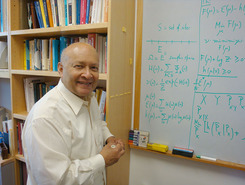
PALO ALTO, CA - Thomas Kailath, a Pune educated Indian-American engineering professor at Stanford University, is one of the recipients of the US National Medal of Science announced by President Barack Obama. Kailath is also a recipient of the Padma Bhushan, one of India’s high civilian awards and is a member of major science and engineering academies in India.

He received his BE degree from the College of Engineering, Pune before getting his SM and ScD degrees in electrical engineering from the Massachusetts Institute of Technology.
He then worked at the Jet Propulsion Labs in Pasadena, before joining Stanford University as associate professor of Electrical Engineering in 1963.
Kailath’s research and teaching at Stanford have ranged over several fields of engineering and mathematics, with a different focus roughly every decade, according to his profile on the university website.
These included information theory, communications, linear systems, estimation and control, signal processing, semiconductor manufacturing, probability and statistics, and matrix and operator theory.
Kailath was promoted to professor in 1968, and was appointed the first holder of the Hitachi America Professorship in 1988. He assumed emeritus status in 2001, but remains active with his research and writing activities. Kailath is a Fellow of the IEEE and has received the IEEE Medal of Honor in 2007 for contributions to the development of powerful algorithms for communications, control, computing and signal processing.
Among his other major honors are the Shannon Award of the IEEE Information Theory Society; the IEEE Education Medal and the IEEE Signal Processing Medal; Guggenheim, Churchill and Humboldt Fellowships.
He is also a member of the US National Academy of Engineering, the US National Academy of Sciences, the American Academy of Arts and Sciences; and foreign member of the Royal Society of London and the Royal Spanish Academy of Engineering.
He then worked at the Jet Propulsion Labs in Pasadena, before joining Stanford University as associate professor of Electrical Engineering in 1963.
Kailath’s research and teaching at Stanford have ranged over several fields of engineering and mathematics, with a different focus roughly every decade, according to his profile on the university website.
These included information theory, communications, linear systems, estimation and control, signal processing, semiconductor manufacturing, probability and statistics, and matrix and operator theory.
Kailath was promoted to professor in 1968, and was appointed the first holder of the Hitachi America Professorship in 1988. He assumed emeritus status in 2001, but remains active with his research and writing activities. Kailath is a Fellow of the IEEE and has received the IEEE Medal of Honor in 2007 for contributions to the development of powerful algorithms for communications, control, computing and signal processing.
Among his other major honors are the Shannon Award of the IEEE Information Theory Society; the IEEE Education Medal and the IEEE Signal Processing Medal; Guggenheim, Churchill and Humboldt Fellowships.
He is also a member of the US National Academy of Engineering, the US National Academy of Sciences, the American Academy of Arts and Sciences; and foreign member of the Royal Society of London and the Royal Spanish Academy of Engineering.

 RSS Feed
RSS Feed
